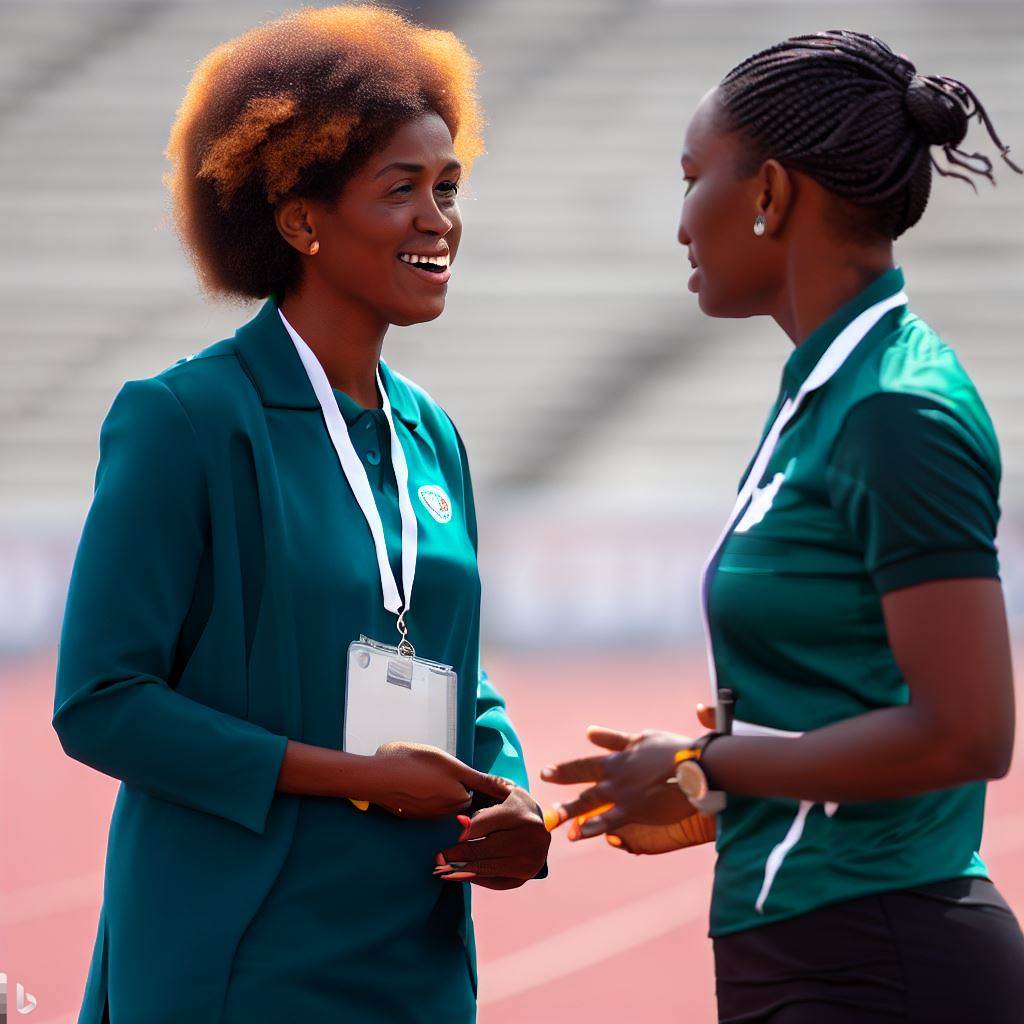Introduction
- Sports ethics and education are vital. They shape character, teamwork, and values in athletes.
- In Nigeria, sports hold immense cultural significance. It’s a passion and a way of life.
- This article delves into the dynamic interplay of sports ethics and education within the Nigerian context.
In Nigeria, sports are more than games; they embody our traditions and aspirations.
These games serve as a platform for imparting values such as discipline, perseverance, and respect for others.
Moreover, they offer avenues for educational growth, fostering skills beyond the playing field.
This article explores the interconnectedness of sports ethics and education in Nigeria.
We will delve into how our unique culture influences these aspects and the benefits they bring to our society.
Join us on this journey as we unravel the profound impact of sports ethics and education on Nigerian lives.
Historical Background of Sports Ethics in Nigeria
A. Overview of Nigeria’s sporting achievements and reputation
- Nigeria has a rich history of sporting achievements, especially in football and track and field.
- The country has won numerous international accolades, including Olympic medals and African Cup of Nations titles.
- Nigerian athletes have consistently excelled on the global stage, earning the nation a respected reputation in the sports world.
- These achievements have contributed to the development of sports ethics in Nigeria.
B. Historical challenges related to sports ethics
- Despite Nigeria’s success in sports, there have been several challenges related to ethics.
- One major issue has been the prevalence of doping among Nigerian athletes.
- Some athletes have resorted to using performance-enhancing drugs to gain an unfair advantage.
- This unethical behavior tarnishes the reputation of Nigerian sports and undermines fair competition.
- Poor sports governance and corruption have also been persistent challenges in Nigeria.
- Embezzlement of funds and administrative malpractice have hindered the growth of sports ethics.
C. Examples of notable cases that influenced the development of sports ethics in Nigeria
- The case of Ben Johnson, a Canadian sprinter of Nigerian descent, brought the issue of doping to the forefront.
- Johnson tested positive for anabolic steroids at the 1988 Seoul Olympics, leading to his disqualification.
- This incident sparked discussions and increased awareness about the importance of ethics in sports.
- Another influential case was the corruption scandal involving Nigerian football officials in 2010.
- The officials were accused of accepting bribes to influence match outcomes, damaging the integrity of the sport.
- These cases prompted Nigerian sports authorities to take action and implement stricter ethical regulations.
- Anti-doping measures were strengthened, and initiatives to promote transparency and accountability were introduced.
In short, Nigeria’s sporting achievements have been notable, but the country has faced historical challenges related to sports ethics.
Issues such as doping and corruption have tarnished the reputation of Nigerian sports.
However, notable cases like Ben Johnson’s doping scandal and the football corruption scandal have influenced the development of sports ethics in Nigeria.
Through stricter regulations and initiatives, the Nigerian sports authorities are working towards promoting fair play, transparency, and accountability.
Read: How to Find a PE Teaching Job in Nigeria: A Guide
The Role of Education in Sports Ethics
A. Importance of incorporating ethical values in sports education
Sports education plays a crucial role in shaping the ethical values of individuals engaged in sports.
Ethical values such as fair play, honesty, respect, and sportsmanship are not inherent in individuals but are learned and developed through education.
Incorporating these values into sports education is of paramount importance to ensure a sustainable and ethical sporting environment.
By integrating ethical values, sports education instills the fundamental principles of integrity and fairness in athletes.
It helps them understand the importance of abiding by the rules and regulations governing sports.
Moreover, it enables them to recognize the significance of respecting opponents, officials, and teammates.
Through education, athletes learn to appreciate the spirit of competition and the positive impact of ethical behavior in sports.
Inculcating ethical values in sports education promotes good character development amongst athletes.
It goes beyond merely acquiring physical skills and focuses on nurturing individuals with moral integrity.
When athletes are exposed to educational programs that prioritize sports ethics, they learn to make moral choices and develop a strong sense of responsibility.
These values transcend the boundaries of sports and become ingrained in their overall life conduct.
B. Nigerian education system and its impact on sports ethics
The Nigerian education system plays a vital role in influencing sports ethics within the country.
The values taught in schools and institutions directly influence the behavior of athletes and sports enthusiasts.
However, it is imperative to critically examine the current state of the Nigerian education system and identify its impact on sports ethics.
One of the key issues prevalent in the Nigerian education system is the lack of emphasis on sports and physical education.
The narrow focus on academic subjects often sidelines sports education, resulting in the neglect of ethical values within sports.
This neglect often leads to incidents of cheating, doping, and unethical practices in Nigerian sports.
Despite this, there have been positive initiatives taken to include sports ethics within the Nigerian education system.
Several schools and organizations have recognized the value of sports in character development and have introduced programs to educate athletes about ethical behavior.
These initiatives aim to create a sustainable sporting culture built on integrity and fair play.
C. Analysis of educational initiatives promoting sports ethics in Nigeria
Various educational initiatives have been implemented in Nigeria to promote sports ethics within the country.
These initiatives signify the recognition of the importance of ethical values in sports and aim to incorporate them into educational programs.
One notable initiative is the introduction of sports ethics courses in universities and colleges.
These courses provide students with a comprehensive understanding of sports ethics, encouraging critical thinking and promoting ethical decision-making.
By equipping future teachers and coaches with knowledge on sports ethics, these initiatives have the potential to create a ripple effect and positively influence the next generation of athletes.
Additionally, sports organizations and federations in Nigeria have embraced educational campaigns to raise awareness about sports ethics.
These campaigns include workshops, seminars, and conferences that emphasize fair play, respect, and sportsmanship.
By targeting athletes, coaches, and officials, these initiatives aim to create a cultural shift towards ethical behavior in Nigerian sports.
In essence, the role of education in sports ethics cannot be underestimated.
By incorporating ethical values into sports education, individuals can develop strong character traits and uphold the principles of integrity and fairness.
While the Nigerian education system faces challenges in promoting sports ethics, initiatives such as introducing sports ethics courses and awareness campaigns are steps in the right direction.
It is crucial to continue fostering a sporting environment that prioritizes ethical values, ensuring the growth and success of Nigerian sports.
Read: Technology in Physical Education: Nigeria’s Approach

Challenges and Controversies in Sports Ethics in Nigeria
A. Corruption and cheating in Nigerian sports
- Corruption and cheating have become pervasive issues in Nigerian sports, tarnishing its reputation.
- Athletes and officials are often involved in match-fixing, bribery, and doping scandals.
- These unethical practices undermine fair competition and the integrity of sports in Nigeria.
- Lack of strict enforcement and accountability mechanisms contribute to the prevalence of corruption and cheating.
- Sports organizations need to prioritize transparency and establish strict anti-corruption measures.
B. Influence of politics and money in sports governance
- Politics and money often dictate sports governance in Nigeria, leading to unethical decision-making.
- Politicians use sports as a platform to gain popularity and advance their agendas, disregarding ethics.
- Financial interests frequently supersede the welfare of athletes and the development of sports programs.
- The government needs to separate politics from sports and ensure that ethical considerations guide decision-making.
- Independence and impartiality should be prioritized in sports governance to overcome these challenges.
C. Ethical dilemmas faced by Nigerian athletes and coaches
- Nigerian athletes and coaches often face ethical dilemmas regarding performance-enhancing drugs and fair play.
- The pressure to succeed may tempt athletes and coaches to compromise their moral values.
- Limited educational opportunities and resources hinder the ethical development of athletes and coaches.
- The influence of a win-at-all-costs mentality creates ethical conflicts in decision-making.
- Education and awareness programs should address ethical issues, empowering athletes and coaches to make ethical choices.
Overall, Nigeria faces significant challenges and controversies in sports ethics.
Corruption and cheating threaten the integrity of sports, while politics and money undermine fair governance.
Nigerian athletes and coaches encounter ethical dilemmas due to various factors.
Addressing these issues requires a collective effort from sports organizations, government authorities, educational institutions, and society as a whole to promote ethics, transparency, and fair play in Nigerian sports.
Read: Networking in Nigeria: Connecting with Sports Information Pros
Positive Examples and Success Stories in Sports Ethics in Nigeria
Nigeria has witnessed a number of positive examples, success stories, and programs promoting sports ethics in recent years.
Ethical role models like Kanu, Okagbare, and Mikel Obi inspire young athletes to prioritize fair play and integrity.
Additionally, educational institutions, such as the University of Lagos and the Nigerian Institute of Sports, have integrated sports ethics into their programs, nurturing a future generation of ethical athletes.
Moreover, the implementation of the Nigerian Sports Ethics and Integrity Policy ensures that sports in the country are conducted transparently and ethically.
Collaborative efforts between the YSFON and educational institutions further strengthen the emphasis on ethics in sports education.
Nigerian sports teams have also proudly represented the nation with their ethical behavior.
The Super Eagles’ fair play and D’Tigress’ sportsmanship have earned them admiration both domestically and internationally.
Athletes like Onyema and Okocha have consistently displayed ethical conduct, serving as role models for aspiring athletes across the country.
These positive examples and success stories highlight the significance of sports ethics in Nigeria.
They demonstrate that ethical behavior in sports is not only attainable but also leads to achievements and recognition.
As the nation continues to promote and prioritize sports ethics, the future of Nigerian sports appears bright, with a new generation of ethical athletes who will uplift the country’s reputation on both local and global stages.
Read: Special Needs Education: PE Teaching in Nigeria
The Impact of Sports Ethics on Personal Development and National Growth
A. Values instilled by sports and education
- Sports and education provide essential values such as discipline, teamwork, and dedication.
- These values are vital for personal development and can positively influence national growth.
- In sports, individuals learn the importance of fair play, respect, and integrity.
- Education reinforces these values by promoting critical thinking, problem-solving, and empathy.
- Both sports and education instill a sense of responsibility and the value of hard work.
B. How ethical sports practices contribute to individual character building
- Engaging in ethical sports practices helps individuals develop strong character traits.
- Through fair competition, athletes learn to respect others and handle both success and failure gracefully.
- Ethical sports practices promote perseverance, leadership, and the ability to work well in a team.
- Athletes who prioritize ethics are more likely to display sportsmanship and positive behavior.
- These qualities contribute to the overall growth and development of individuals in society.
C. Analysis of the potential positive societal impact of promoting sports ethics in Nigeria
- Emphasizing sports ethics can positively impact Nigerian society on various levels.
- By promoting fair play, sports ethics can reduce corruption and dishonesty in sports.
- Athletes who prioritize ethical practices can become role models for younger generations.
- Such role models can inspire others to participate in sports and adhere to ethical standards.
- By promoting sports ethics, Nigeria can foster a culture of integrity, unity, and national pride.
- This, in turn, can lead to an increase in sports participation and overall national development.
In essence, the impact of sports ethics on personal development and national growth cannot be overstated.
The values instilled by sports and education, such as discipline, teamwork, and dedication, contribute to the growth and development of individuals.
Ethical sports practices play a crucial role in character building, fostering traits like respect, perseverance, and leadership.
By promoting sports ethics in Nigeria, the society can experience positive transformations, including reduced corruption in sports, the emergence of inspiring role models, and the cultivation of integrity and national pride.
Embracing sports ethics will undoubtedly contribute to both individual and societal well-being and elevate Nigeria’s standing in the global sporting arena.
Strategies to Enhance Sports Ethics and Education in Nigeria
A. Propose the role of government policies and legislation
- The Nigerian government should develop and enforce strict policies and legislation to promote sports ethics and education.
- These policies should include guidelines on fair play, anti-doping measures, and character development in sports.
- By implementing such policies, the government can create a culture of integrity and fairness in sports.
- Legislation should also address issues such as age fraud, gender discrimination, and corruption in sports.
B. Importance of grassroots initiatives and community involvement
- Grassroots initiatives play a crucial role in promoting sports ethics and education at the grassroots level.
- Local communities should organize sports events that emphasize fair play, respect, and moral values.
- Parents, teachers, and community leaders must actively participate to instill ethical values in young athletes.
- These initiatives can help identify and nurture talented athletes while also teaching them important life skills.
C. Advocate for collaboration between educational institutions, sports organizations, and government bodies:
- Collaboration between educational institutions, sports organizations, and the government is vital for promoting sports ethics and education.
- Schools should prioritize physical education and incorporate ethical values into their sports curriculum.
- Sports organizations should provide training and workshops on sports ethics and fair play for coaches and athletes.
- Government bodies should allocate sufficient funding and resources to support sports ethics programs and initiatives.
In general, enhancing sports ethics and education in Nigeria requires a multi-faceted approach involving government policies, grassroots initiatives, and collaboration between various stakeholders.
Strict government policies and legislation will set the foundation for promoting integrity, fairness, and moral values in sports.
Grassroots initiatives and community involvement will reinforce these values at the grassroots level.
Collaboration between educational institutions, sports organizations, and government bodies will ensure a comprehensive and sustained effort towards improving sports ethics and education in Nigeria.
By implementing these strategies, Nigeria can develop a generation of athletes and sports enthusiasts who not only excel in their chosen fields but also uphold the highest ethical standards.
Conclusion
A. Importance of Sports Ethics and Education in Nigeria
In Nigeria, sports ethics and education are more than ideals; they’re pillars of progress.
They mold character, instill values, and foster excellence.
B. Continued Efforts for Ethical Sports Practices
Nigeria must persevere in promoting sports ethics.
This requires education at all levels, from grassroots to elite sports, to uphold fairness and integrity.
C. Long-Term Benefits of a Strong Sports Ethics Culture
Embracing sports ethics culture in Nigeria can lead to enhanced sportsmanship, global recognition, and a healthier society overall. It’s a winning strategy for the nation’s future.




